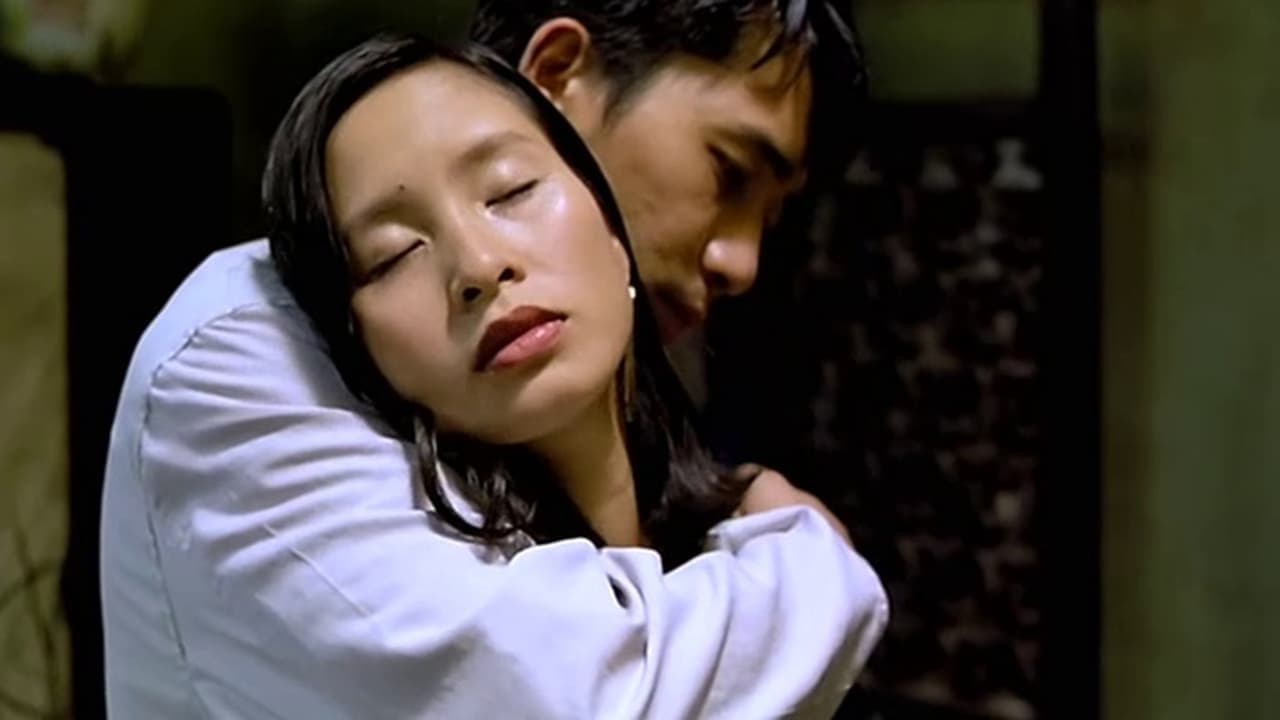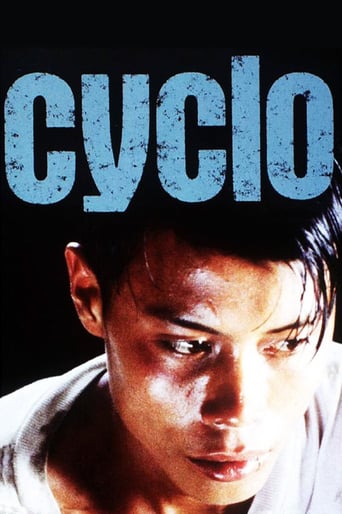

Most undeservingly overhyped movie of all time??
... View MoreIf you like to be scared, if you like to laugh, and if you like to learn a thing or two at the movies, this absolutely cannot be missed.
... View MoreVery good movie overall, highly recommended. Most of the negative reviews don't have any merit and are all pollitically based. Give this movie a chance at least, and it might give you a different perspective.
... View MoreA great movie, one of the best of this year. There was a bit of confusion at one point in the plot, but nothing serious.
... View More"Cyclo" begins with neo-realist naturalism, as a young man struggles day to day driving his cycle taxi in modern day Vietnam. His father has just died, and after working his entire life as a bike-taxi driver, has nothing to leave his children, but the suggestion that they might find something nobler to do with their lives. The young man spends his days navigating the alleys and the side streets for the quickest routes and attempting to avoid collisions with other bike taxi drivers who have divided the city into turfs and gangs, of who can pick up customers where.One day his taxi is stolen, and to repay the taxi's owner (a local lady crime boss); he has to take on a series of petty crimes to pay the debt. The young man is never given a name; the credits refer to him as "Cyclo", his sister as "sister" etc. His sister(played by the gorgeous Tran Nu Yen-Khe begins a tenuous relationship with the boss of the gang Youth works for, a silent constantly smoking man called "Poet" played by the always excellent Tony Leung. By relationship I mean he pimps her out to old business men provided they "not touch her", instead she indulges their foot and urine fetishes, in at first disturbing and then increasingly reflective and resigned scenes. The Poet rarely speaks but we hear his poetry for time to time in voice over, obliquely appearing and disappearing. The first half of the film focuses more on Cyclo getting in over his head with the gang, stealing, transporting drugs,and lighting a rival building on fire with a Molotov cocktail.The second half shows us more of the "Poet" and "the Sister". Dialog is sparse throughout, but the sister seems to only really exist in relation to the poet, he pimps her out, but not too much. That may be going too far, as we do get a "sense" that her indulging the fetishists is more amusing and certainly less physically tiring than the work she was doing before. Leung's apartment becomes a kind of club house for the girls, a paradoxical bordello of innocence. The Poet is corrupt but wants to keep some aspects of his life pure. There are scenes where he is beaten by his father and collapses into sudden helpless boyhood, and a virtuoso and pivotal scene in a nightclub set to Radiohead's "Creep", in the best tradition of using pop songs to encapsulate not just moment in time (the 90's in which the film is set), but the very heart of a character. When Yorke sings "what the hell am I doing here?" it might as well be Leong singing it aloud.As Cyclo becomes more fascinated with the power, attention, and adrenalin rush he is getting from the gang, "Poet" becomes more aloof splitting his time between the three girls he pimps, and he the lady crime boss who he serves as soldier and lover(or whore depending on how you look at it). Vietnamese/French director Ahn Hung Tran delicately weaves us in and out of violence and tranquil beauty, near psychedelic explosions of color and poetic reflections, pimps and corpses and children happily at play.After he commits his first major crime, we see him covered in filth, as he had to escape the police in a river or tunnel. The escape isn't fully shown, and we are left with the image of the crime and then the criminal covered in what looks like s*&t; insects crawling slowly across his lips in a close up. To clean his face he puts it in a fish bowl (his only company in the dilapidated room the Poet forces him to live in.), and effectively contaminates the world of the only friend he had. It's a great visual metaphor for gang violence and corruption and its effect on community life, it just makes everything dirtier and sh*&$ier.By the end of the film, Cyclo does not come to his senses, but implodes on himself, and get's a brief offer to escape the life he bumbled or was forced into (its implied that one of the Lady crime bosses henchman was involved in stealing Cyclo's taxi in the first place.) The crime queen's handicapped son, who is Youth's same age, is a kind of mirror image of him throughout the film; financially privileged to his economic struggle, an eternal child to his forced growing-up, the apple of his mother's eye to the deafening absence of being an orphan. Cyclo's blue neon painted face at the end is less about psychedelic freak out as it is a desperate desire to escape back to the simplicities of childhood. The fates of the Poet, Youth, and the crime mistresses' son each reach their peak, at the same moment, showing us the product of innocence/idiocy and evil/apathy. In psychological terms this is guilty and reflective super-ego (poetic Leung) and impulsive childish Id (overgrown man-child son) on two opposite poles of self-destruction, and Ego sandwiched between the two, clinging to a faint possibility of hope/rationality."Cyclo" is compulsively watchable and despite its experimentations easily accessible. The films score reminded me of a Hitchcock film, and is responsible in large to the films strange atmosphere, as if a horror film lurks just beneath the surface at all times, waiting to escape. In a sense the ominous sound-scape is fitting, as there is a horror waiting to devour the characters, and it is their lives. "Cyclo's" cinematic and aesthetic techniques amount to nothing less than incredibly solid and visually breathtaking storytelling, that elevates it's well-worn concept a step above the rest.
... View MoreThe movie was screened two years ago, on my recommendation, and mainly to a UK and some foreigners' audience. Reception and comments about the movie were not as expected: "rubbish!" was heard from an old member, "great!" by some other. There is no in-between when it comes to this movie, most UK people have found it too realistic, most foreign ones saw it as a clear depiction of Ho Chi Minh City's decadence and corruption. In my opinion, this movie has got the merit of showing how things are, and how characters are not so clear-cut in their badness or goodness. It feels like everyone is looking for a form of forgiveness by trying to redeem themselves of past/current actions. In the end, I recommend the movie regardless, though British viewers may find some scenes upsetting. It is not often that the viewer can find such a mix of feelings in a movie's characters. A movie which should not leave you indifferent, that's for sure.
... View MoreCyclo introduce us to the though reality of life. In this case the slums of Saigon are taken as an example, however, it's obvious that there are not concrete references to the country itself as any other low income area could be taken as environment. The movie is rather rational structured, as it begins with tough but still normal lives of the main characters. As the plot unfolds, this first normal situation is suddenly shaken and everyone's life is completely changed in worse by those who impose their ruthless force upon others. During this unhappy experience, the two main characters experience how mean can people be to one another and they see how tough can life be, even worse than the way they were used to before, though one was an housekeeper and the other a bike-taxi driver. As the movie slings to its end, the two wretches are finally redeemed and they both go back to their normal life. "A normal life, which everyone deserves to lead". At the very end we hear this words, said by one of the pimps. Perhaps this is the real core of the movie. It's always better to lead your life the way it is, as long as the situation does not give you too pain. Furthermore, a change of life, both in better or in worse doesn't always bring more happiness. Thus, the movies ends in exactly the same situation it begins, however, everyone is much happier sticking to this way, rather than trying to change his situation going through all the troubles they have experienced.
... View MoreTran anh Hung films have to be watched with a photographic sensitivity, for it relates to the color and shapes as a medium to express feelings and mood. As I was watching Xich Lo, with great curiosity as I lived in Ho Chi Minh city for a while, I was caught by this sense of surreality that the movie expresses to and fro. This is definitively not a movie about Vietnamese reality as a saigonese inhabitant can see it, but rather an author's view about a magic city (as I can define cities with magic, and cities without), recalling what can be seen in some footage of HK in trendy Wong Kar Wai movies (especially Fallen Angels)... The cast also focuses about this Vietnamese-Chinese mixed up story (This happens in Cholon, Saigon's Chinese district), and Tony Leung's long stances, silences, cigarettes, brings back to some HK underground ambiances... Add to this Hung's way to break plot rhythm, waving between poetic calm to harsh violence, and you get a movie rather unique in its genre, that I surely enjoyed. 8 out of 10
... View More